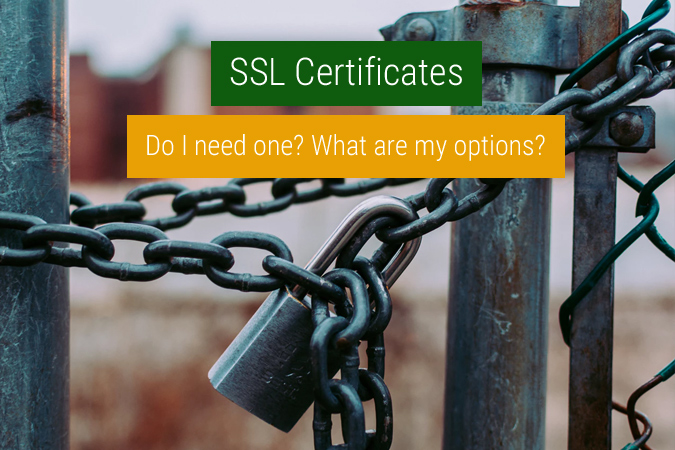SSL Certificates – Do I Need One? What Are My Options?

If you run an online business or you have a website for lead generation, you may have heard about SSL certificates.
SLL certificates are small data files which, when installed on your sites server, act like a digital padlock to allow safe, secure transactions. Whether these are financial transactions or simply customers login information, SSL certificates allow website users to safely navigate you website, without fear of their information being stolen.
Do I need one?
While in the past, SSL certificates were generally reserved for large, e-commerce based websites, SSL certification is steadfast becoming a best-practice recommendation.
This is driven by an update of the Google Chrome browser, which features a warning label (“not secure”) in the address bar of websites without SSL certification that collect payment information. Other browsers, including Firefox and Internet Explorer have followed suit with this label.
Google has also indicated that SSL certification is (and will continue to be) a ranking factor in their search engine results. Therefore it is widely accepted that in 2018, you should have SSL certification for your website.
How do I get an SSL Certificate?
The answer to this varies depending on what CMS your website is built on. For websites built of Squarespace and Shopify, you do not need to worry as this has already been done for you. However, these are shared SSL certificates, meaning they are used across multiple websites. If you have a website on these platforms which has grown to the point where you are dealing with hundreds of daily transaction, you may wish to get a dedicated SSL certificate.
If your website is on WordPress, you will need to get your own SSL certificate. There are a broad range of different kinds of SSL certificates, ranging from $0 (from LetsEncrypt) right through to $500 from well-known providers (Verisign, GeoTrust, Thawte).
In terms of security, most certificates provide the same 256-bit encryption; the difference is in warranty, features and brand. Expensive certificates may provide a warranty of up to $1.5 million, display your business name in the address bar (before URL) and provide more trust, reputation to the website users.
However, for small – medium sized e-commerce or lead generation websites, you do not require an expensive SSL certificate. We would recommend a budget under $100/year. It is more cost-effective to purchase an SSL certificate from an overseas provider as they can provider better rates and bulk discounts. For example an SSL certificate from Namecheap start at just $9 USD/year.
Installing an SSL Certificate
An SSL certificate will need to be installed by your web developer through your hosting provider. The process is not for the faint hearted and put simply, involves downloading your certificate file and then installing it onto your server. This process varies depending on your SSL certificate type and the type of server your website is hosted on. A breakdown of SSL certificate installation for various servers can be found here.

